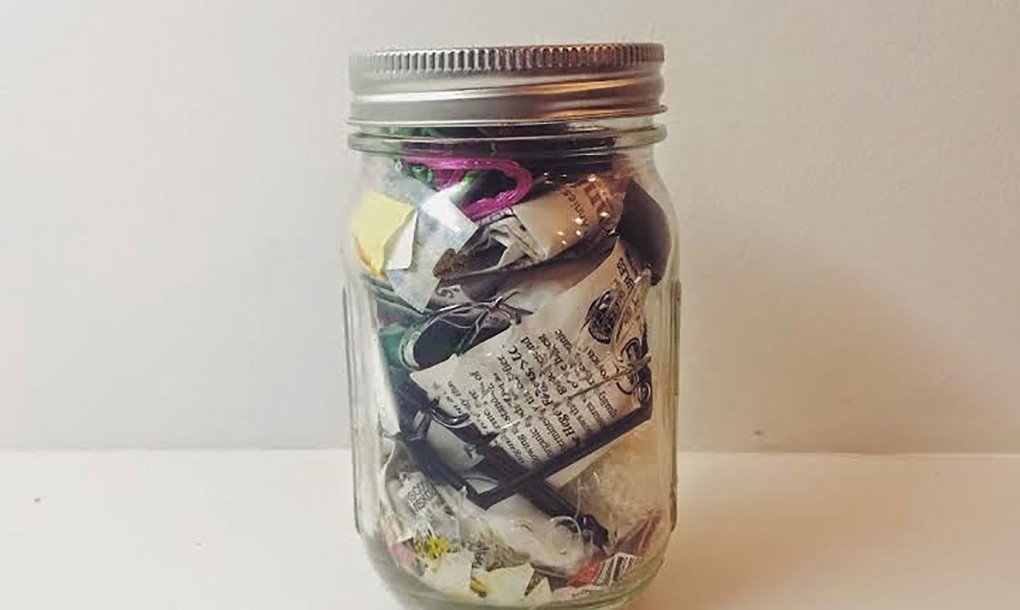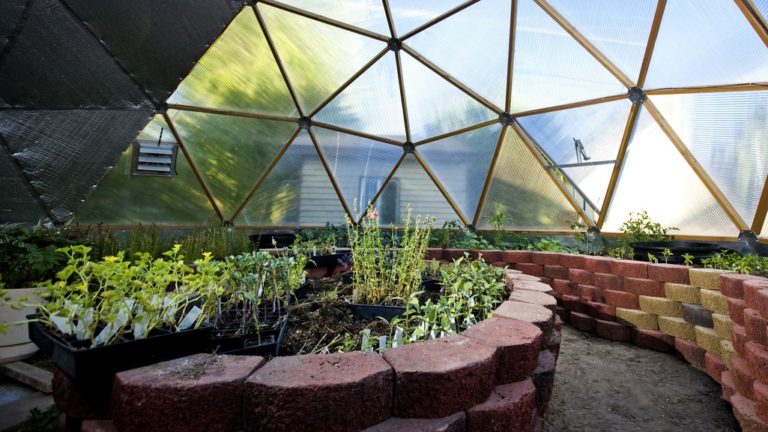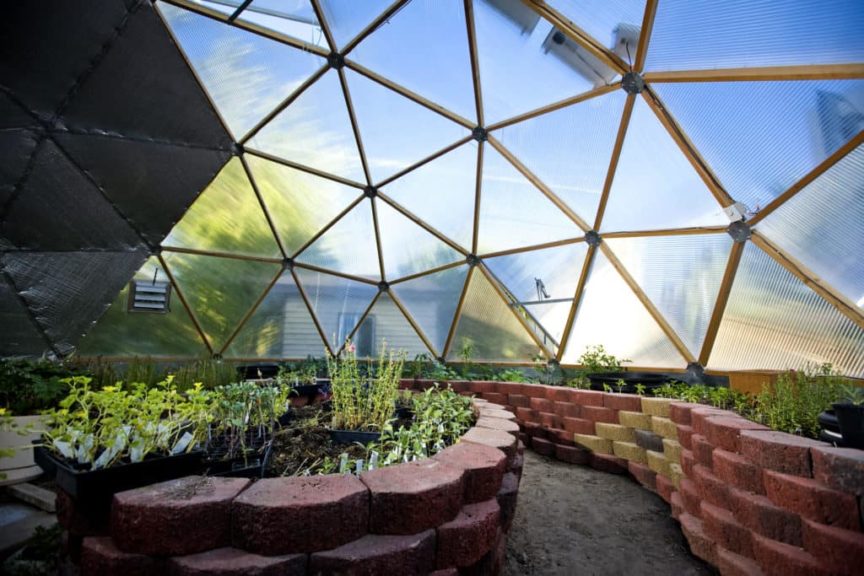Eliminate Trash From Your Life By Going Zero Waste

We live in a wasteful society that solves every inconvenience with a disposable product. Plastic bags, cutlery, Tupperware, packaging; all of these conveniences add up, don’t easily biodegrade, and are often unable to be recycled. Not to mention, all of these products are traditionally made from oil, creating an incredibly unsustainable, dirty, and environmentally devastating cycle. But there are people working to solve this crisis by eliminating trash from their lives and showing the world how to go zero waste.
The Zero Waste Lifestyle
One of the icons of the zero-waste home movement, Bea Johnson, implemented a minimalist mindset within her family, that cut her household’s annual waste down to about a 12-oz. jar of a random assortment of plastics. She has inspired her family to commit to this goal and in so doing, saved money, created a healthy lifestyle, and drastically reduced their carbon footprint.
Her first and foremost rule is to refuse anything you do not need. By saying no to disposable plastics and paper, you are doing your part in eliminating the demand for those products.
Johnson says zero waste doesn’t mean more, but rather less recycling, by preventing waste in the first place. The majority of plastics that can be recycled can only go through that process one time before they end up in landfill.
When it comes to household plastics, glass jars, bowls and bottles make convenient, reusable replacements. And when you go to the grocery store, buying non-perishable foods in bulk to fill those glass jars saves time, money, and the environment.

Zero waste home enthusiasts are thrifty when it comes to toiletries and beauty products. Without sacrificing hygiene, it’s possible to make homemade versions of toothpaste, make-up and facial lotions. Buying castile soap in bulk is their secret to replacing household cleaners, which can double as soap for the shower. And baking soda is another multi-faceted product that has endless applications for cleanliness.
After implementing these zero waste lifestyle changes in her family’s routine, Johnson found they were healthier due to a lack of chemicals in the household and more mindful eating habits.
She also found her family saved about 40 percent of their income compared to prior habits. This allowed them to save money to invest in renewable energy through solar panels, contributing to future conservation and savings. It also allows her family to take vacations more often, cultivating a conscious lifestyle that values experience over material goods.
Cities Implementing Zero Waste Living
A number of cities passed, or are in the process of passing, legislation that aims to target zero waste living goals within the coming years. Some cities, including San Francisco and Portland, are leading the charge, making most municipalities look downright wasteful.
True to its nickname, the Golden City has already achieved 80-percent waste diversion, while Portlandia barely trails behind at 70 percent. But when it comes to urban refuse terminology, zero waste implies only 85-percent waste diversion, not entirely trash-free.
In comparison, that percentile is lightyears ahead of most cities that size, as well as what most cities are even striving for in the coming decades. Dallas, Texas sluggishly plans to hit 60 percent over the next 12 years.

Even in cities with a reputation for being progressive, such as Boulder, CO, waste diversion isn’t where one might expect it to be. While the city is actively working to implement a bullish zero waste program, Boulder’s current system only diverts 34 percent of its rubbish. Although, with its latest plan, involving upgrades for its recycling center, financial incentives for businesses, regulations and advisory programs, Boulder hopes to reach 80 percent diversion by 2025.
The city says 90 percent of the trash that ends up in its landfill is either recyclable or compostable, meaning the zero waste goal is mostly a matter of policy and logistics. In the past Boulder implemented policies with reduced waste intention, including a 10 cent tax on all plastic bags, but some cities took that a step further, banning them entirely.
Zero Waste Girl
Another luminary for those seeking an example in the zero waste movement is Lauren Singer, a.k.a. the zero waste girl, who has become Johnson’s disciple, spreading the good word about the zero waste lifestyle. Just like Johnson, Singer can fit her past few years’ waste inside a mason jar and has become somewhat of an internet celebrity for her refuse-free savoir faire.
While studying at university, Singer found herself internally passing judgment on a classmate for her callous use of plastic bags and disposable goods. As an environmental science major, she imagined herself on a moral high ground, appalled by what she saw.
Then she went home and realized her fridge was packed with plastic wraps, Tupperware, and disposable products. She immediately realized the hypocrisy and dismounted her high horse to join the radical green revolution.

Singer’s youth appeals to the millennial generation that asks, “How can I do this when I live in a city, imbibe, and lead a busy lifestyle?” Her simplistic solutions proved anybody, no matter where you live or what you do, can significantly, if not entirely, reduce waste.
With the craft brewing (and distilling) movement becoming almost omnipresent, you can buy a glass growler and fill it up at the brewery down the street, and this is precisely what Singer does. This is almost always cheaper than buying beer at the store, as is everything that doesn’t have to be packaged. Johnson noted 15 percent of the cost every time you buy something goes toward packaging, so if you eliminate that element, you’ll save at least that much every time.
One brewery is also working on recreating the plastic six-pack rings that are so damaging to the eco-system by producing edible rings. Even when you cut up the rings and feel like you’re doing your part to save the turtles from suffocating, they eat them anyway. For so long, this has been such a destructive issue, that was solved with a relatively simple, zero waste solution that just required conscious effort.
You’ll find numerous organizations these days championing this mindful sentiment by spreading awareness and petitioning governments to implement these policies. This is a systemic problem, as we were brought up in a society of waste. Though most of us are unaware that we even do it; it’s ingrained in our culture. Once we start making and demanding change we can reverse some of the damage we’ve done and create a better future.
Buckminster Fuller's Spaceship Earth Is More Relevant Than Ever

How do we make the world work for 100 percent of humanity, in the shortest possible time, through spontaneous cooperation, without ecological damage or disadvantage to anyone? That was the question posed by R. Buckminster Fuller when he devised the Operating Manual for Spaceship Earth, the concept that we are all astronauts inhabiting a spaceship, hurtling through the universe, with a greater purpose than just being muscle-reflex machines.
The Earth is a Spaceship
There is a common experience that is shared between astronauts who traveled to the moon and looked back on Earth. A sense of enlightenment, utter transcendence, and overwhelming bliss from the beauty and perfection of Earth in its entirety. At this point astronauts understand the importance and necessity of taking care of our planet and the collective need to coexist peacefully.
Though he never went to space to experience this profound perspective, Fuller shared this sentiment and devoted his life to modeling a future that would embrace it. He was a designer, inventor, author, architect, and systems specialist, but most notably a visionary whose ideas focused on considering the greater picture even when working on the minutiae.
Fuller’s vision for humanity focused on the premise that our intellect gave us an innate duty to overcome physical constraints, ad infinitum, with our ability to think, reason, and solve problems. With this, he coined the word ephemeralization, the concept that the sum can be greater than its parts; that we have the ability to do more and more with less and less, until we can achieve everything with nothing.

Though this might seem paradoxical at its extreme, the utility that we have been able to achieve with technology has followed this line of thinking to a certain extent. Our ability to go from wired to wireless technology or fossil fuels to alternative renewables are examples that embody Fuller’s vision.
This is counter to the Malthusian line of thought, in which exponential population growth will inevitably outpace food production. Fuller argued that through design and technology there should be no reason to have people suffering and starving on Earth. He aimed to create a world that worked for everyone, employing technology to spread our limited resources and satisfy a growing population.
His vision became one which focused on a utopian society of sorts, in which a ‘critical path’ could be developed to cooperatively pilot Spaceship Earth. By using foresight that looked outside of the box and focused on systemic problems in every aspect; solving current problems with the prudence to also solve future ones.
Richard Buckminster Fuller
Fuller’s upbringing seemed to incubate the eccentric genius that he later became in life. His education started at a Froebelian kindergarten, where art and creativity were given as much encouragement as traditional education. Later in life, Fuller attended Harvard though he was kicked out twice, recognizing himself as a non-conformist, misfit.
After serving a brief stint in the Navy, Fuller and his father founded a company that provided affordable, lightweight, weatherproof housing, a concept that would later become the foundation of his design philosophy. But the company eventually failed, and shortly after his daughter passed away from polio and meningitis.
Fuller contemplated suicide when his family fell into financial hardship, which was compounded by the self-imposed guilt from his daughter’s death. Until one day, he had a profound experience in which he felt himself levitating off the ground, encapsulated in a sphere of white light. A voice told him:
“From now on you need never await temporal attestation to your thought. You think the truth. You do not have the right to eliminate yourself. You do not belong to you. You belong to Universe. Your significance will remain forever obscure to you, but you may assume that you are fulfilling your role if you apply yourself to converting your experiences to the highest advantage of others.”
After this turning point Fuller began to teach at Black Mountain College in North Carolina, an experimental school in Asheville, that had a non-hierarchical structure, atypical to most universities. There, students and teachers were considered peers and there were no grades, degrees, or planned curricula. Students decided when to graduate and education was equally balanced with art, farming, co-op labor, and construction projects.

Here, Fuller built his first geodesic dome which he would patent and become known for. This design would later become the iconic geodesic dome, Spaceship Earth, at Epcot Center in Disney World, an homage to Fuller and Walt Disney’s shared dream of a utopian society. EPCOT itself is an acronym that stands for Experimental Prototype Community Of Tomorrow.
The Montreal biosphere, constructed for the 1967 World Fair is another commonly recognized geodesic dome designed by Fuller that remains to this day.
Though the first geodesic dome had already been ideated and built some 30 years prior, Fuller was the first to patent it and incorporate it into his schema for its myriad uses. He found maximum utility in the design as it used minimal material to provide the greatest amount of volume in a certain area.
A geodesic dome is a hemispherical structure consisting of rigid triangular elements, or an omni-triangulated surface. Fuller was attracted to it for its strength and simplicity, inspiring the construction of hundreds of thousands of them throughout the world. But despite, the avant-garde popularity of the geodesic dome, it was just one design feature that may have overshadowed his larger worldview.
Livingry not Weaponry
One of Fuller’s main concepts was that of livingry, a word he created in direct opposition to weaponry. Livingry touted inventions that supported and enhanced life, ideas, and objects; enriching and advancing human existence, rather than contributing to its destruction. He imagined what could be achieved if the aerospace sector of knowledge was applied only to producing technology that advantaged all of humanity, rather than divisive weaponry. He saw war as obsolete and the threat of total destruction as imminent.
Fuller viewed humanity as an experimental initiative of the universe. That experiment was to see if the universe, in all its complexity, could “maintain the integrity of eternal regeneration” while allowing us, humans, to discover and use mathematical laws to maintain that integrity on our scale.

The answer to this was yes, inspiring Fuller to develop an array of consumer household designs to fit his ephemerilized livingry concepts. He even coined another word to sell his ideas: dymaxion, a portmanteau of dynamic, maximum, and ion. He conceptualized a dymaxion house, dymaxion car, dymaxion bathroom, and others to solve every contemporary design flaw, though most never came to fruition, outside of fringe communes and individual projects.
Though his worldview never truly took off, today we can see a lot of Fuller’s sentiment in the tech industry. Whether directly inspired by Fuller or not, many modern digital solutions aim to solve all of our problems with ephemeralization, using the least amount of energy to gain the most utility; the internet being one of the greatest examples. Though he passed away less than 40 years ago, it would be interesting to know what might he think of our society today. Will we ever achieve a global society like Fuller envisioned?




































